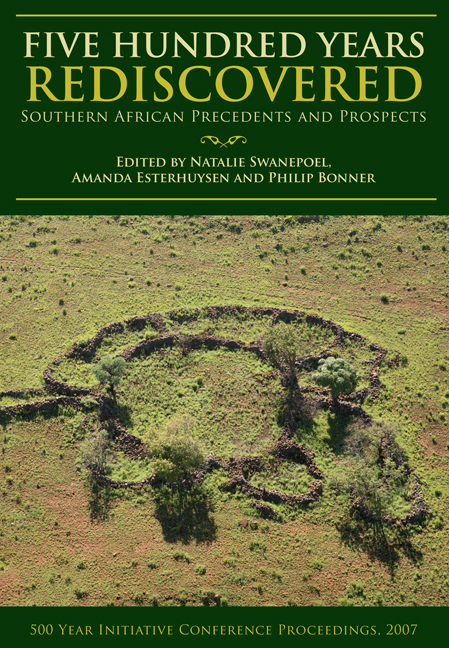Book contents
- Frontmatter
- Contents
- Preface
- 1 Introduction
- Section 1 Disciplinary Identities: Methodological Considerations
- Section 2 Material Identities
- Section 3 ‘Troubled Times’: Warfare, State Formation and Migration in the Interior
- 12 Rediscovering the Ndwandwe kingdom
- 13 Swazi oral tradition and Northern Nguni historical archaeology
- 14 Mfecane mutation in Central Africa: a comparison of the Makololo and the Ngoni in Zambia, 1830s-1898
- List of contributors
- Index
12 - Rediscovering the Ndwandwe kingdom
from Section 3 - ‘Troubled Times’: Warfare, State Formation and Migration in the Interior
Published online by Cambridge University Press: 30 May 2019
- Frontmatter
- Contents
- Preface
- 1 Introduction
- Section 1 Disciplinary Identities: Methodological Considerations
- Section 2 Material Identities
- Section 3 ‘Troubled Times’: Warfare, State Formation and Migration in the Interior
- 12 Rediscovering the Ndwandwe kingdom
- 13 Swazi oral tradition and Northern Nguni historical archaeology
- 14 Mfecane mutation in Central Africa: a comparison of the Makololo and the Ngoni in Zambia, 1830s-1898
- List of contributors
- Index
Summary
Introduction
The history of the Ndwandwe kingdom is one of the great casualties of the particular circumstances in which southern Africa's precolonial pasts were narrated and written from the late 1820s onward. The break-up of the Ndwandwe kingdom under Sikhunyana kaZwide after its defeat by the Zulu under Shaka kaSenzangakhona in 1826 destroyed its ruling elite and ruptured the processes in which memories of the kingdom's past were being transmitted orally by intellectuals linked to that elite. To be sure, groups of Ndwandwe lived on in the polities which consolidated in the 1820s and 1830s as the Zulu, Swazi and Ndebele kingdoms, but under conditions in which public narrations of their histories, like those of other subordinate groups, tended to be suppressed in favour of tellings of the histories of the respective ruling groups. As Socwatsha kaPhaphu (1921: 10), one of James Stuart's informants put it,
In the Zulu kingdom, people did not discuss matters of former times to avoid being put to death …. For a person who spoke about these things would be killed. It would be said, ‘Where did you get this from? You will spoil the land with this talking.’
Another group of Ndwandwe, which had broken away from Zwide's rule in about 1820 under the leadership of Soshangane kaZikode, went on to establish what became the Gaza kingdom in southern and central Mozambique. In this case, Gerhard Liesegang tells us (1981: 181-182, 202), memories of its past became fragmented after the defeat of the Gaza by the Portuguese in 1895 and the deliberate breaking-up of its ruling elite by the new colonial overlords. The overall effect was that by the beginning of the 20th century, at the latest, ‘officially’ sustained tellings of the history of the old Ndwandwe kingdom had effectively come to an end.
For their part, the white writers who arrived in the Zulu kingdom in the 1820s and 1830s left records which fed into an entire colonial mythology about Shaka and his times but made only the barest mention of the Ndwandwe.
- Type
- Chapter
- Information
- Five Hundred Years RediscoveredSouthern African precedents and prospects, pp. 217 - 238Publisher: Wits University PressPrint publication year: 2008

